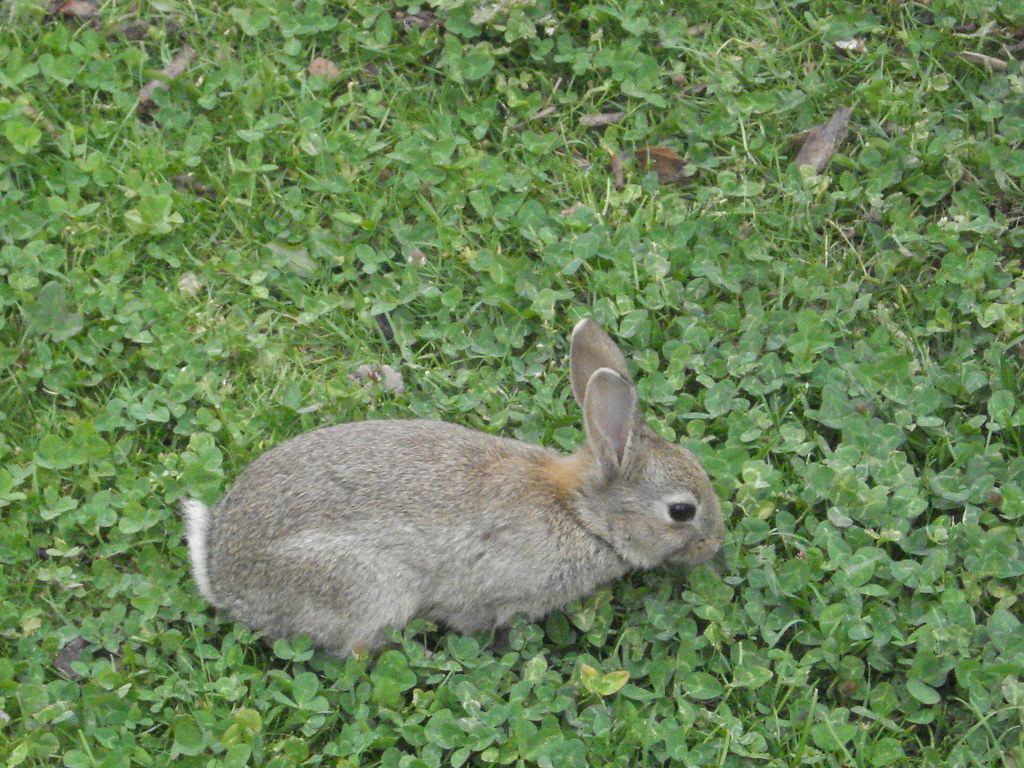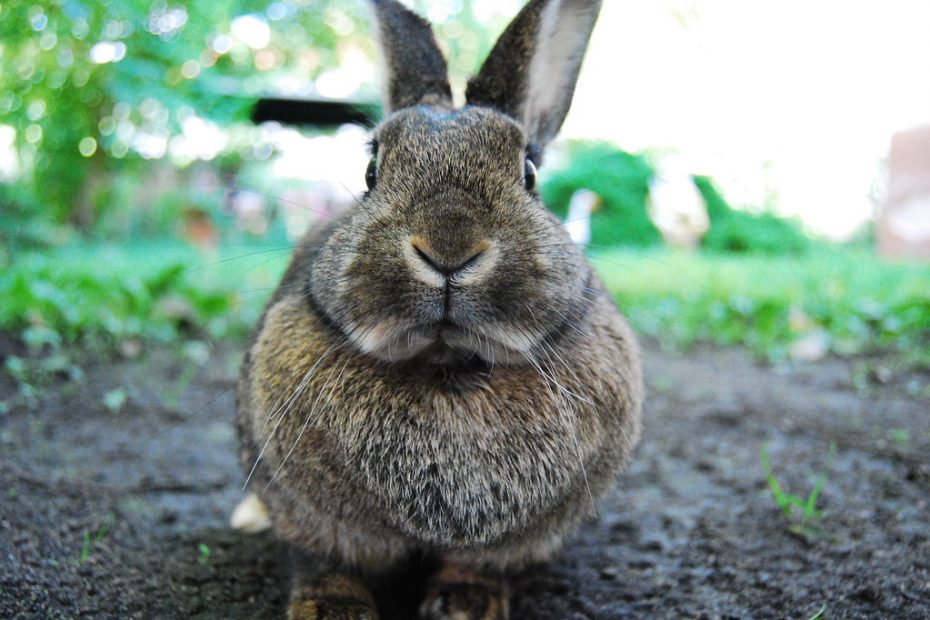Rabbits can be a curse or a blessing. While they make excellent pets – especially for kids – they can also be a nuissance in your herb garden. So whether you are wondering if you can feed herbs to your pet rabbit or whether wild rabbits are going to eat your herbs, you’ve come to the right place! Do rabbits eat herbs?
Rabbits eat many common garden herbs such as clover, basil, parsley, tarragon, dill, and cilantro. Rabbits tend to avoid catnip, mint, chives, sage, and thyme.
In this post, we’ll examine what herbs rabbits do and can eat and how much to feed your pet rabbit. In the second part, we’ll also go over which herbs rabbits don’t eat and how you can keep rabbits away from your herb garden.
What herbs do rabbits eat?
Rabbits eat many different varieties of herbs and are not too picky when it comes to plants. Among these are dill, parsley, comfrey, basil, tarragon, cilantro, caraway, rosemary, sage, oregano, lavender, and clover.
However, this list is by no means exhaustive. Different types of rabbits in different regions might have very distinct eating habits and avoid certain types of herbs. For instance, while some rabbits chow down on oregano just like any other herb, others might be more hesitant and avoid the plant due to its strong flavor.
Another herb that but most rabbits will not eat but some do is lemon balm. But let’s take a look at the full list of herbs rabbits can eat in more detail!
Herbs rabbits can eat
These are herbs most rabbits can eat:
- Dill
- Parsley
- Comfrey
- Basil
- Tarragon
- Cilantro
- Caraway
- Rosemary
- Sage
- Oregano
- Lavender
- Clover
Since rabbits it a large variety of different herbs almost any herb garden will be in danger of being decimated by a hungry rabbit. On the other hand, you can also use your homegrown herbs to feed your pet rabbits. They will surely appreciate the delicate leaves of many herbal plants.

However, when feeding herbs to your pet rabbit it is important to measure ahead of time how much herbs you are going to give them. Too large quantities of some herbs can make rabbits sick or even kill them.
How much herbs can rabbits eat?
Full grown rabbits can eat as much as 2 cups of fresh herbs per day. Younger rabbits have a more delicate digestive system and should only be treated to half a cup of herbs per day.
In addition, your rabbits might need time to adjust to the taste and texture of herbs if they haven’t been part of their diet before. To get started, sprinkle in a few leaves of herbs into their regular food and then increase the quantity gradually over the next few weeks.
Rabbits will also enjoy eating larger quantities of some herbs and less of others. Herbs with a heavy fragrance and flavor profile tend to be enjoyed in more moderation by rabbits than other milder herbs.
Herbs with such heavy fragrances include oregano, lavender, and rosemary. On the other hand, milder herbs like parsley, dill, and coriander make an excellent food source for rabbits even in larger quantities.
There are some herbs that rabbits just won’t touch. Usually, this is because the herb would negatively affect their health and upset their stomach. Let’s look at these herbs in the next section!
What herbs do rabbits not eat?
Rabbits do not eat catnip, catmint, lemon balm, mint, chives, sage, and thyme. While there can be exceptions, most rabbits tend to avoid the aforementioned herbs because of their scent and taste.
These are the herbs rabbits will typically not eat:
- Catnip
- Catmint
- Lemon balm
- Mint
- Chives
- Sage
- Thyme
As with all lists there can be some exceptions with some species of rabbits but for the most part planting any of the above herbs in your garden is a safe bet against rabbits.
While there are some herbs rabbits simply don’t eat because they don’t like their smell or taste, there are others that are outright dangerous for rabbits to consume. These types of herbs and plants might seriously harm a rabbits digestive system and could be deadly.
Potentially dangerous and lethal herbs and plants for rabbits include avocado, apple seeds, tomato plants, almonds, belladonna, foxglove, and wild carrots. In turn, any of the aforementioned plants will also be safe in your garden from any hungry rodents.
How keep rabbits from eating your herbs
Let’s talk about how to keep rabbits out of your garden, so you can enjoy the savory leaves of your herbs in your own cooking. Keeping rabbits and other animals such as deer and bears at bay can be tricky.
On the one hand, the most effective way to protect your crops but it might not be such a convenient idea to fence in your entire property with a 5-foot-barbwire fence. So, I’ll discuss the simplest approaches first and then move on to the more hardcore methods if all else fails.
- Chili Pepper Spray: Spraying your herbs with some blended cayenne pepper is one of the most effective and simplest ways to keep rabbits from eating them. Rabbits abhor the harsh scent of chili peppers and will not touch herb leaves that have been sprayed. Coincidentally, this technique will also keep deer and even bears at bay.
- Vinegar: Another fantastically easy way to keep rabbits away from your herb garden is to set up buckets or cloths soaked in vinegar around your herbs. This will not only mask the fresh scent of herbs but also create an intense fragrance that rabbits avoid.
- Garlic: Placing crushed garlic cloves close to your growing herbs is another simple way that has worked for me in keeping your herbs safe from rabbits. Turns out, it’s not only good against vampires 😉
If the above methods have not worked for you and colonies of hungry rabbits still ravish your herb fields, there are some harsher measures you can take. Let’s look at the two most common ones that will ban rabbits from your garden forever.

- Fences: If all else fails a fence is probably your best bet to keep rabbits at bay. Make sure that it is at least 2 feet high and goes 6 inches into the ground. Rabbits are excellent jumpers and diggers and will otherwise find a way past – especially if there are delicious savory herbs on the other side.
- Chicken wire: If you don’t want to fence in your garden you could also consider building a small cage of chicken wire as a protective shell around your herbs. Make sure to also cover the ground as much as possible or else rabbits will simply build a tunnel under the wire.
Conclusion
Rabbits eat many common garden herbs. While there are some herbs rabbits will not touch, keeping rabbits from eating your herbs can be harder than it seems. I’ve found that the best methods are usually the simplest ones.
“Rabbit ! / Kaninchen!” by Robobobobo is licensed under CC BY-SA 2.0; “Rabbit” by James F Clay is licensed under CC BY-NC 2.0; “Old tent frame for seedlings chicken-proofed with chicken wire” by hardworkinghippy : La Ferme de Sourrou is licensed under CC BY-SA 2.0
- Are Herbs Perennial? - January 29, 2021
- Can Herbs Survive Winter? - January 28, 2021
- Can Dogs Eat Herbs? - January 27, 2021
